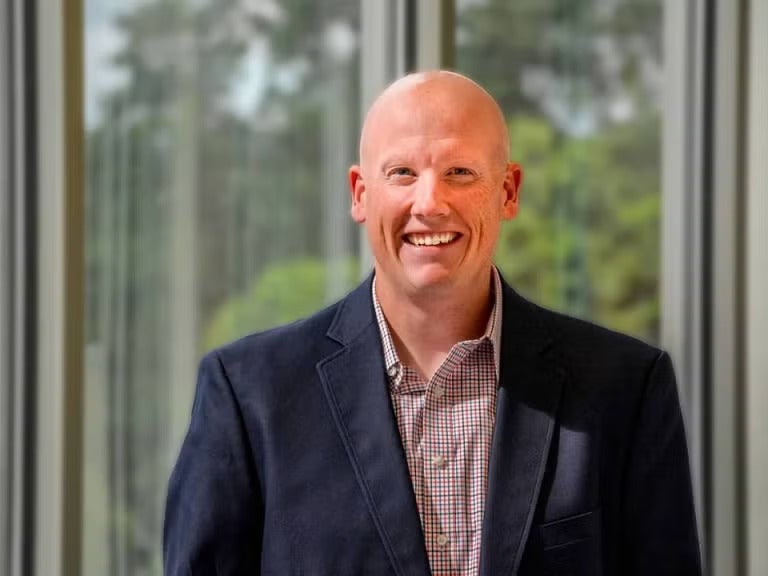UPDATE: The University of Pittsburgh’s affordable, one-year online Doctor of PA Studies (DPAS) program for practicing physician assistants/associates now awards a Doctor of Medical Science (DMSc)!
Original story:
Jason Thomas is a current Doctor of Physician Assistant Studies (DPAS) student and physician assistant who has been practicing for 18 years. He practices gastroenterology for Excela Health while teaching full-time at Seton Hill University where he’s been since 2019. Here’s why he chose Pitt’s online, post-professional Doctor of PA Studies program and why he’s excited to share his experience with fellow colleagues.
—————-
About a year ago, I was going through programs and saw this new online degree at the University of Pittsburgh designed for PAs by PAs, and that’s what drew me to it. I also live in Latrobe, which is about an hour east of Pittsburgh, and I have a wife and two kids that are very busy in sports and other activities so relocating or commuting to a school was not an option. I thought, “Do I really want to do this? Can I do this?” There were many questions that ran through my mind, and so I had to do some self-reflection.
Mary Allias, assistant professor and director of the Doctor of PA Studies program, was kind enough to answer my questions one day via a Zoom call. We talked about the program’s vision for PAs. In teaching, I feel like you have a commitment to really lead, and there’s no better way to lead students than by demonstrating your own commitment to furthering your education. It’s something that can never be taken away from you.
Cost was the number one consideration. It’s a fixed price and very reasonable. The timeframe was also very attractive to me. You can go straight through for a year, which is what I’ve decided to do. The program’s focus on improvement was really big, too. I don’t want to spend a lot of time taking classes that I’m not going to apply to my work, and I thought that was really a great thing.
From day one of this program there is no wasted time or energy. It’s challenging but doable. One of the first things we did was identify something we wanted to improve in our workplace. I looked at it from the perspective of my students. What could I do for my students to better equip them to care for their patients? I ultimately settled on focusing on diversity, equity and inclusion with patients. I wanted my students to be more aware of issues in society, and of different patient populations and the challenges they face.
I chose a dual phase project where I first worked with my students in groups, and I also recruited some members of our Seton Hill community from diverse populations to have dialogue sessions about challenges in health care and about their experiences in life. I was really blown away by how powerful these sessions were. After that we had a professional patient simulation group come in and they simulated cases with patients from these populations. I’m now in the process of digesting all the data that was collected, like measuring how impactful this was, and, overall, the student feedback was very good. There was nothing like this in the literature that I looked at before starting this project.
You prepare for this capstone with the faculty and your advisor. You also have to work within a timeframe, so everything has to be designed in a way that’s practical. I found that networking was really the most impactful thing. I talked to people within Seton Hill that I haven’t really interacted with much before. I met people outside of my area who were experts, validating my surveys. Right now, I’m using my literature review from the summer and the work I did in the in the fall to prepare for my final capstone presentation and paper.
Overall, the timeframe and organization of the program have been great! I thought there might be a little bit of trial and error or technical glitches with everything online, but our class never found that. Everything was quite smooth but challenging. It’s not something that’s easy. I think there are some misconceptions that you can enroll and pay your tuition, and you’re going to be good to go. It’s a lot of work, but it’s meaningful work.
One final positive I want to mention is that in the fall you can do a professional communication project. I chose to speak at the Pennsylvania Society of Physician Assistants (PSPA) conference since it was on my bucket list. This program really provided the nudge that I needed to go ahead and do it. It’s sometimes intimidating to be a community practitioner and speak among your peers who may have higher levels of education or have been practicing longer. After I presented, one of my preceptors from PA school approached me and congratulated me, and it was just a great moment of personal fulfillment.
It’s hard to believe a year ago many of us, in this cohort, were just contemplating, “Can we do it?” and “Is it worth it?” Thanks to the Pitt PA faculty for designing a program that makes the answer to each of these questions an unequivocal “Yes!”

